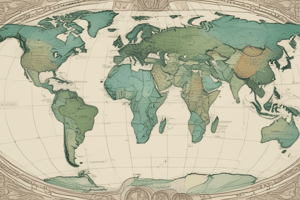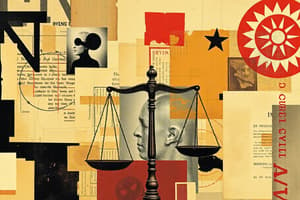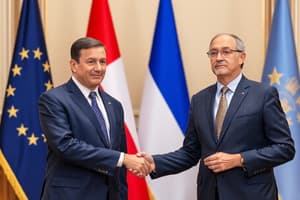Podcast
Questions and Answers
What principle provides immunity to states for their sovereign acts?
What principle provides immunity to states for their sovereign acts?
Which of the following individuals is NOT typically protected by personal immunity?
Which of the following individuals is NOT typically protected by personal immunity?
In the context of commercial transactions, states generally do NOT enjoy immunity under which principle?
In the context of commercial transactions, states generally do NOT enjoy immunity under which principle?
What was the ICJ's position in the Arrest Warrants Case regarding high-ranking state officials accused of grave crimes?
What was the ICJ's position in the Arrest Warrants Case regarding high-ranking state officials accused of grave crimes?
Signup and view all the answers
Which statement regarding personal immunity is true?
Which statement regarding personal immunity is true?
Signup and view all the answers
Which entities are primarily granted immunity from the jurisdiction of foreign municipal courts?
Which entities are primarily granted immunity from the jurisdiction of foreign municipal courts?
Signup and view all the answers
What is the primary rationale behind granting states immunity from claims in other states?
What is the primary rationale behind granting states immunity from claims in other states?
Signup and view all the answers
What does Article 2(1) of the UNC emphasize regarding states?
What does Article 2(1) of the UNC emphasize regarding states?
Signup and view all the answers
Which case established that one sovereign cannot be tried in the courts of another sovereign?
Which case established that one sovereign cannot be tried in the courts of another sovereign?
Signup and view all the answers
What was the significance of the Schooner Exchange in the context of jurisdiction?
What was the significance of the Schooner Exchange in the context of jurisdiction?
Signup and view all the answers
Which phrase best describes the jurisdiction of nations regarding their own territories?
Which phrase best describes the jurisdiction of nations regarding their own territories?
Signup and view all the answers
In the Schooner Exchange case, who originally owned the vessel before its seizure?
In the Schooner Exchange case, who originally owned the vessel before its seizure?
Signup and view all the answers
What happens when a foreign state is involved in a legal matter in another state’s courts?
What happens when a foreign state is involved in a legal matter in another state’s courts?
Signup and view all the answers
What does functional immunity refer to in international law?
What does functional immunity refer to in international law?
Signup and view all the answers
What was the result of the Belgium arrest warrants issued for DRC officials?
What was the result of the Belgium arrest warrants issued for DRC officials?
Signup and view all the answers
Which of the following statements about the Pinochet case is correct?
Which of the following statements about the Pinochet case is correct?
Signup and view all the answers
According to the Vienna Convention on Diplomatic Relations, what principle underlines the character of diplomatic missions?
According to the Vienna Convention on Diplomatic Relations, what principle underlines the character of diplomatic missions?
Signup and view all the answers
What led to the diplomatic crisis between the UK and Libya in 1984?
What led to the diplomatic crisis between the UK and Libya in 1984?
Signup and view all the answers
Which article of the UN Charter addresses the principle of sovereign equality of states?
Which article of the UN Charter addresses the principle of sovereign equality of states?
Signup and view all the answers
What does the term 'persona non grata' refer to?
What does the term 'persona non grata' refer to?
Signup and view all the answers
What is a common issue regarding diplomats and parking fines?
What is a common issue regarding diplomats and parking fines?
Signup and view all the answers
Study Notes
Public International Law - Immunities
- Certain individuals and institutions are immune from foreign jurisdiction in international law.
- Key examples of these entities include foreign states, heads of state, diplomatic agents, consuls, and international institutions (and their officials).
- Immunity is justified by the need to promote international cooperation and peaceful relations between states, while also protecting their sovereignty.
Sovereign Immunity
- A state is immune from lawsuits in another state.
- This principle stems from the idea of sovereign equality among states emphasized in the UN Charter.
- The landmark case Schooner Exchange v McFaddon (1812) established the absolute nature of a nation's jurisdiction within its own territory. One sovereign cannot be tried in the courts of another.
- The case involved a French warship seized by the U.S.; the U.S. courts lacked jurisdiction.
Distinguishing Sovereign Acts and Commercial Acts
- Immunity applies differently depending on whether a state act is sovereign (jure imperii) or commercial (jure gestionis).
- Sovereign acts of states generally receive sovereign immunity.
- Commercial transactions by a state do not.
Personal Immunity (ratione personae)
- Certain individuals, like heads of state, heads of government, and foreign ministers, are immune from civil and criminal jurisdiction in other states.
- This immunity applies during their official functions and often continues even after they leave their positions.
Arrest Warrants Case (DRC v. Belgium, 2000)
- This case highlighted a possible exception to the rule of personal immunity, even for high-ranking state officials accused of grave crimes.
- The International Court of Justice (ICJ) acknowledged that immunity does not prevent prosecution in specific circumstances.
Functional Immunity (ratione materiae)
- This immunity protects state agents performing official functions.
- It covers acts done in an official capacity, extending beyond the duration of the official position.
- Key examples include instances where a state agent's actions are deemed inappropriate by the international community (e.g., human rights violations).
Vienna Convention on Diplomatic Relations (1961)
- Diplomatic relations and privileges are based on state consent.
- Diplomats are bound to respect the laws of the host nation and not interfere in its internal affairs.
- However, diplomats are entitled to immunities.
Libyan Embassy Incident (1984)
- A Libyan diplomat in London fired shots at protestors and killed a British policewoman.
- The case highlighted a potential challenge to diplomatic immunity when the act is deemed improper or against the domestic laws of the host country.
Abuse of Immunity (e.g., parking violations)
- Diplomats have been accused of exploiting immunity for purposes beyond their official functions.
- Cases like unpaid traffic tickets in the UK and NYC demonstrate alleged abuse of this immunity.
Germany v. Italy (ICJ, 2012)
- This case involved claims against Germany concerning actions committed during World War II.
- The ICJ ruled against the state-based immunity claim based on the international legal obligation to uphold international human rights.
- The decision highlighted the potential for states to be held accountable for serious violations of international law.
Studying That Suits You
Use AI to generate personalized quizzes and flashcards to suit your learning preferences.
Related Documents
Description
Explore the principles of immunity in public international law, focusing on sovereign immunity and its implications for states and officials. Understand key cases like Schooner Exchange v McFaddon and the distinction between sovereign and commercial acts. This quiz delves into how immunities promote international cooperation and protect sovereignty.





